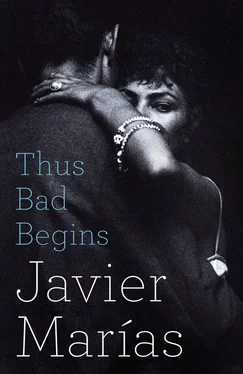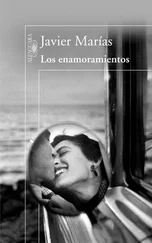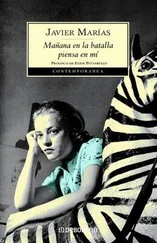But it was entirely the hostess’s fault that the supper never happened, even though all the guests arrived and I opened the door to them and helped Flavia and Susana to greet them and show them in: I was, as usual, hanging about at the apartment and had been appointed to keep Lisa Raines entertained, since I was nearest in age to her; I hadn’t been invited as a guest, and so there wasn’t even a place for me at the table.
Beatriz had been going through a depressive phase, that at least is how I interpreted it. While he was filming, Muriel was rarely at home and often didn’t come back at night to sleep, either because he was on location somewhere or preferred to stay at a hotel, and despite their poisonous relationship, his absence probably contributed to his wife’s despondency or low spirits — we miss no one so much as our adversary, when we’ve grown accustomed to having to defend ourselves and to resist, to stand beneath the moon, persuading and imploring. Perhaps she saw in that void a warning of what the future might hold for her one day, when divorce finally became legal. She didn’t neglect her morning or evening duties as an English teacher, and she spent time with her children, her mirror-images, but otherwise I rarely saw her leave the apartment: not with Rico, nor to visit Our Lady of Darmstadt nor the Plaza del Marqués de Salamanca nor to set off on her motorbike going who knew where. On the other hand, I did hear coming from her side of the apartment the metronome ticking on and on, forty times a minute if not more, occasionally accompanied by a few chords, but usually by nothing at all, not a sound, apart from the pendulum beating back and forth like a noisy, heterodox clock telling something other than the time: the music unplayed or the words thought and stored away to the beat of the metronome, the beat of boredom or of a hesitant countdown, aborted and restarted again and again, over and over. Since Muriel was not there, it was clearly no longer a reminder to him of her existence, nor a threat or a complaint or a rhythmic representation of her sufferings, nor was it a drumming of fingers as a prelude to an explosion. Despite what my boss had told me (‘She takes her time, then gets distracted and falls asleep at the piano. As long as she’s there, she’s fine.’), I would get worried if, for a whole long hour, I heard only that ominous, unhinging tick-tock. I would stop what I was doing, go over and press my ear to the closed door that gave on to her side of the apartment, expecting to hear her moan or sigh or hum or exclaim or sob; or to perhaps hear her talking to herself or even cursing as mad people do or the lonely or those sunk in self-pity. And when I still heard only the metronome beating on, undaunted, I would at last get up the courage to knock very lightly, as Beatriz sometimes did on Muriel’s bedroom door, and when she answered: ‘Yes, who is it?’ or even, yearningly (I thought), ‘Is that you, Eduardo? Are you home?’ I would feel both relieved and ridiculous and say:
‘No, I’m sorry, Beatriz, it’s me, Juan. I just wondered if you needed anything, if you were all right. I haven’t heard you playing for quite a while, and you know how much I like to hear you play.’ I addressed her automatically and informally as tú , as we men do with women, as if they were children, or else they themselves urge us to do so, as if they found it far harder than men to accept being addressed more formally as usted, which they imagine makes them seem somehow older. At the time, she was about forty-one or forty-two, the age Mariella Novotny was when she was killed or died or committed suicide; nowadays, there would be no doubt about it, she would still be considered young. However, then, and given the difference in age, she did not seem young to me. Nor did I think of her as old, that would have made a nonsense of my vague or theoretical feelings of sexual admiration for her, my attraction to her fleshly beauty, a beauty that seemed to belong to another age and another place, or, as I said before, to some other dimension, some long-past, inanimate dimension.
‘Don’t worry, Juan, I’m fine. I leave the metronome on even when I’m not playing. It soothes me and helps me to think.’ That or something similar is what she would murmur to me through the door (her voice slurred and faint, as if I had torn her from sleep or from some imagination or machination), for she never opened the door when I knocked like that. Was she perhaps not fully dressed or only in her underwear? I would wonder, and then go back to my work.
On the day of the supper party, she was too busy getting things ready to need the metronome. She had ordered the main course from a restaurant like Mallorca or Lhardy or possibly from the Palace Hotel, I’m not sure. She gave Flavia the necessary instructions and took charge of the wines and the dessert, at least I assume she did, it wasn’t really my business. Muriel was filming at the studio and wasn’t expected back until eight fifteen or thereabouts, along with the two actresses and Herbert Lom, for whom he would wait at the hotel until they had showered and changed, then drive them to the apartment in his car. Rico had been given orders (as a young man, he was rather more eager to please than he is now) to pick up Towers and Wheeler, and the others would arrive under their own steam. Most of the guests were foreign, Muriel had nevertheless suggested they arrive at around half past eight and then sit down to eat at about nine; it was late spring, and the sun already took a while to disappear, and it was, he said, depressing to dine in broad daylight. By six o’clock — before the children were back from school — Beatriz appeared to have everything prepared and under control, she changed her clothes, did her hair and make-up, put on her high heels and went out. She had spent so many days without going out, except to her classes — during this sad or apathetic phase — that my curiosity got the better of me and I followed her as I had on other occasions, wanting to know who it was she had suddenly felt the need to see or who had roused her from her misanthropic mood, Van Vechten or the man in Plaza del Marqués de Salamanca, or possibly neither of them. She was wearing a skirt, which made it seem unlikely, although not impossible, that she would take the motorbike, because I did once see her mounted on the bike with her skirt pulled right up — without a flicker of embarrassment and as if it were the most natural thing in the world — revealing almost as much of her strong thighs as Celia the civil servant had in the taxi.
She did not go very far. She stopped outside the Hotel Wellington, just a few metres down the street and on the same side, and I saw her look up as if expecting a signal from someone staying in one of the rooms that faced on to the street, someone who might indicate with a nod or a lift of his eyebrows: ‘Come up, come up, I’m here already.’ If so, this must be a third lover, I thought, otherwise why would she meet up with Van Vechten or with one of the Poles Kociejowski or Gekoski or with Deverne or Mollá or Arranz, in a different place and so close to her own apartment, just before an evening when, purely in order to please Muriel, she was expecting a load of semi-important guests? Or perhaps that was precisely her reasoning, so that she would be close by and not risk arriving late. She stood gazing up at the windows or balconies for about thirty seconds before she went in. I approached the hotel’s lofty portal — a liveried doorman was on guard, they probably still have a doorman now, I haven’t been past the place for a while, I tend to avoid it — and I tried to peer in, to see if she had stopped in the foyer or headed for the bar or taken the lift. I saw no sign of her, even though I waited on the pavement for three or four or five minutes, time to chain-smoke two cigarettes. Had I gone inside, the porter wouldn’t have turned a hair, the hotel has always welcomed bullfighters, and I could have been a bullfighter’s young apprentice or even some up-and-coming matador; however, it made more sense not to risk her finding me there, because then it would have been clear that I had followed her, given the short distance and the closeness to home. Perhaps she was going to have a drink with Gloria and Marcela at the bar, so as not to get bored at home before supper, and the prospect of that social gathering meant that she couldn’t settle down alone with her metronome. While I was watching and waiting, I spotted the conductor Odón Alonso getting out of a right-hand-drive car — a Daimler or a Jaguar, I think — already in his evening clothes, as if about to give a concert. He left the keys with a valet and walked past me, humming and smiling. It was said he had a permanent suite at the Wellington, where, curiously enough, he almost always stayed with his wife. The thought crossed my mind that Beatriz might be meeting him. For some reason, I dismissed the idea.
Читать дальше












